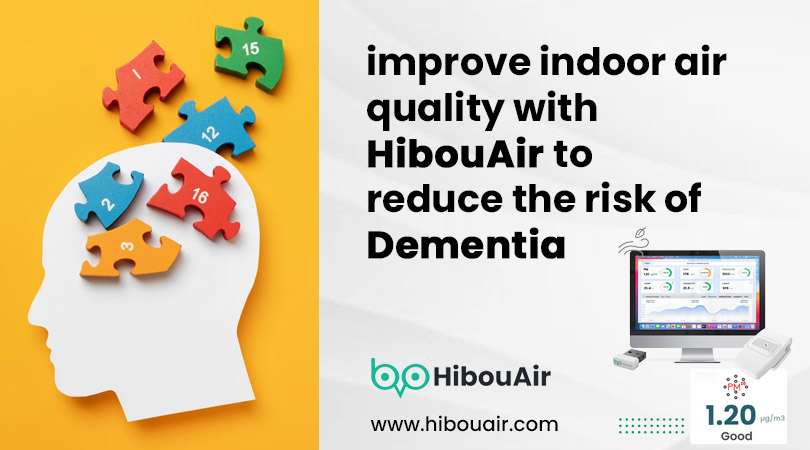Monitor and improve indoor air quality to reduce the risk of Dementia
The quality of the air we breathe is a crucial factor in maintaining our overall health and well-being. While most people are aware of the importance of clean outdoor air, it’s easy to overlook the significance of indoor air quality (IAQ). Recent studies have drawn a concerning connection between poor IAQ and the increased risk of developing dementia. To combat this threat and take control of your indoor environment, it’s essential to employ effective solutions such as the HibouAir indoor air quality monitor.
The Link Between Indoor Air Quality and Dementia
Research has shown that long-term exposure to high levels of indoor air pollutants can significantly increase the risk of cognitive decline and neurodegenerative diseases like dementia. Several indoor pollutants, such as volatile organic compounds (VOCs), particulate matter, and chemicals emitted from household products, have been identified as contributing factors to this increased risk.
In recent years, a growing body of research has shed light on the alarming connection between air pollution and neurological illnesses, particularly dementia. These studies emphasize the urgency of addressing indoor air quality concerns and highlight the importance of monitoring devices like HibouAir.
A study conducted by the University of Michigan found a compelling link between air pollution and neurological illnesses, including dementia. This research underscores the critical role that indoor air quality plays in our cognitive health, as pollutants can infiltrate our living spaces, posing a direct threat to our well-being.
Source : Comparison of Particulate Air Pollution From Different Emission Sources and Incident Dementia in the US | Environmental Health | JAMA Internal Medicine | JAMA Network
A systematic review and meta-analysis published in The BMJ (British Medical Journal) explored the impact of air pollutants on the risk of dementia. This comprehensive study brought together a wealth of existing research, providing a more in-depth understanding of the detrimental effects of poor air quality on cognitive health. The results were clear: exposure to air pollutants significantly increases the risk of dementia.
Source : Ambient air pollution and clinical dementia: systematic review and meta-analysis | The BMJ
A cross-sectional study utilizing data from the Longitudinal Ageing Study in India (LASI) revealed that exposure to indoor air pollution negatively affects the cognitive function of middle-aged and elderly rural women in India. This study underscores the global nature of the issue, highlighting that air quality concerns extend far beyond developed nations.
Source : Exposure to indoor air pollution and the cognitive functioning of elderly rural women: a cross-sectional study using LASI data, India | BMC Public Health | Full Text (biomedcentral.com)
An analysis of more than 50 studies found a direct correlation between exposure to particulate matter and an increased risk of dementia. Shockingly, the risk of dementia was shown to increase by 4% for every 2 micrograms/cubic meter increase of particulate matter in the air annually. This statistic underscores the urgency of addressing air quality to protect our cognitive health.
Source : Air Pollution May Be Increasing the Risk of Dementia | Time
Public health scientists at Harvard University conducted an in-depth analysis of several studies, revealing a particularly concerning aspect of air pollution. Inhaling toxic air pollutants known as PM 2.5 was found to significantly increase the risk of dementia. These findings further emphasize the role of fine particulate matter in the development of cognitive disorders, making it imperative to monitor and mitigate such pollutants in our indoor environments.
Source : Air pollution may raise risk of dementia, analysis shows – The Washington Post
The Role of Indoor Air Quality Monitors
While adopting the above practices is essential, having real-time data on your indoor air quality can empower you to make informed decisions and take timely action. This is where the HibouAir indoor air quality monitor comes into play.
HibouAir is a cutting-edge device designed to monitor and analyze the quality of the air in your home continuously. It measures key parameters like CO2, VOC levels, particulate matter (PM 1.0, PM 2.5, PM 10), humidity, temperature, pressure and more, providing you with a comprehensive overview of your indoor environment. With its user-friendly interface, smartphone and desktop app, you can easily access and interpret the data, making it a valuable tool for safeguarding your health.
The device can alert you to any sudden spikes in indoor pollutants, helping you identify and mitigate potential sources of pollution promptly. Whether it’s a malfunctioning household appliance, increased humidity, or high VOC emissions from cleaning products, HibouAir keeps you informed so you can take action to protect yourself and your loved ones.
In an era where the importance of maintaining good health has become increasingly apparent, we must not neglect the air we breathe indoors. The link between poor indoor air quality and the risk of developing dementia is a serious concern that cannot be ignored. By implementing measures to improve IAQ and incorporating advanced indoor air quality monitoring devices like HibouAir into our homes, we can take proactive steps to reduce this risk and ensure a healthier and more comfortable living environment for ourselves and future generations. Don’t wait until it’s too late; prioritize your indoor air quality today.

